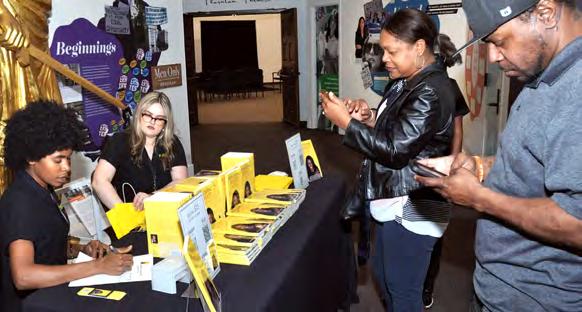
2 minute read
ARTICLE CONTINUATION
professor of tax law at the University of Chicago; and economists in the U.S. Department of Treasury’s Office of Tax Analysis. The researchers concluded that the disparity “is unlikely to be intentional on the part of IRS staff.”
The team’s research showed that a set of internal IRS algorithms causes racial differences in audit selection. Goldin compared them to the recipe for Coca-Cola: “It’s completely secret.”
To better understand this audit selection bias, the research team modeled the racial impact that various alternative audit selection policies might have. The result showed how the IRS could change its secret algorithm to make it less unfair to people of different races.
“The IRS should drill down to
THOMPSON:
Continued from cover understand and modify its existing audit selection methods to mitigate the disparity we’ve documented,” Ho said. “And we’ve shown they can do that without sacrificing tax revenue.”
Spring Valley. President Bishop Blair Holloway and Helena Holloway welcomed church mem bers, family and guests to a jubi lant celebration that awarded 13 graduates for their completion of the George D. McKinney L.E.A.D. (Leadership, Empowerment, and Development) School for Urban Ministry Program, a one-year internship that empowers the local church in leadership and develop ment. There were also two selected to receive Honorary Doctorates, Community Leader Tracy Thompson and M.A.N.D.A.T.E.
Although there have been longstanding questions about whether the IRS uses its audit powers somewhat, Ho said it was challenging to study because tax returns are private. The IRS’s approach to audit decisions was confidential. That changed when, on his first day in office, President Joe Biden signed Executive Order 13985. This order requires all federal agencies to examine how their programs affect racial and ethnic equity.
To apply that order to the IRS tax return audit program, economists at the Treasury Department worked with the Stanford RegLab team to analyze more than 148 million tax returns and about 780,000 tax used anonymous data to do the analysis.
Even with all that information, the research team found that tax returns do not ask for a person’s race or ethnicity. So, the team adapted and improved on a state-of-the-art approach that uses first names, last names, and geography (U.S. Census block groups) to predict the probability that a person identifies as Black.
After finding that Black taxpayers were 2.9 to 4.7 times more likely to be audited than non-Black taxpayers, the team looked at why this might be the case. They suspected that the problem lay with an IRS algorithm’s use of the Dependent Database, which flags a potential problem and generates an audit letter to the taxpayer.
That instinct proved correct in that most racial differences were found in so-called “correspondence” audits. These audits are done by mail rather than in person. The team also found that the IRS audits people more often who claim the Earned Income Tax Credit (EITC).
The EITC helps low- and moderate-income people.
The largest source of disparity occurs among EITC claimants. Indeed, Black taxpayers accounted for 21% of EITC claims but were the focus of 43% of EITC audits.
The racial disparity in audit rates persists regardless of whether EITC claimants are male or female, married or unmarried, raising children, or childless. Perhaps the most striking statistic is this: A single Black man with dependents who claims the EITC is nearly 20 times as likely to be audited as a non-Black jointly filing (married) taxpayer claiming the EITC.
Although the team does not know precisely what algorithm the IRS uses to choose audits, they thought of several possible reasons for high
Records owner and Program Director of Godradio1.com, Michelle Thompson (no relation). The ceremony was followed by a soul-stirring message from guest speaker Dr. Jack Sheets and many souls renewing their commitment in service to God in ministry.









